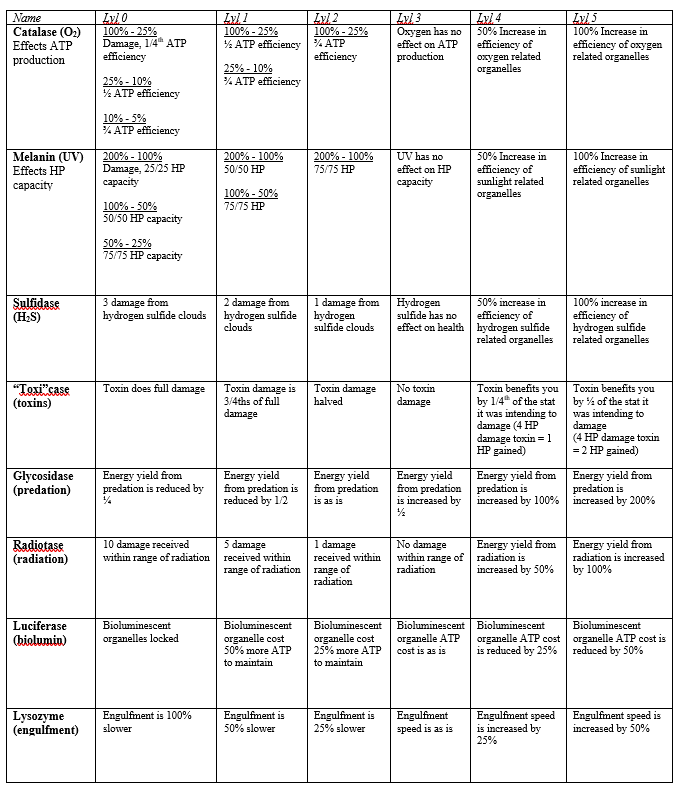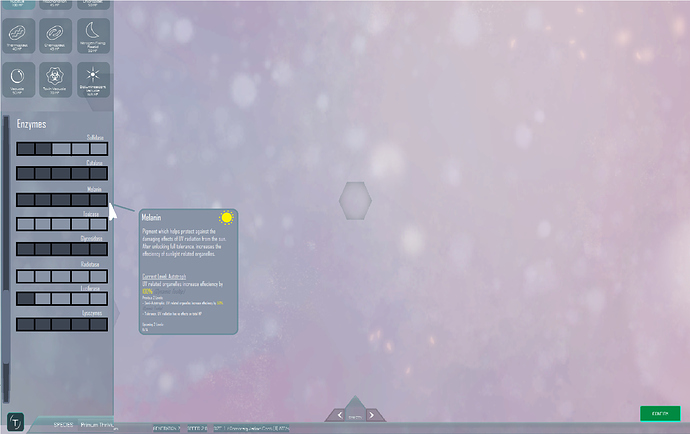I really like these ideas, but two small notes, one smaller than the other: It currently shows engulfment as slowing down for the benefits, which I don’t think is on purpose. The second point is a bit larger: would this not make radiation and H2S function basically the same, which is a damaging source of energy where you can decrease the damage with enzymes? The only difference is how you would acquire the source of energy, from a cloud or from a rock. (Then again, the same can be said for glucose versus H2S in the current version, so I’m not sure)
Thank you for pointing out that typo.
I see what you mean; it does seem kind of repetitious. Thing is, I’m not too sure what else could be represented as damage from radiation. Perhaps radiation could instead hurt progress towards reproducing, so that if you swim too close to radiated material, you would have to wait a certain amount of seconds until you can reproduce. Upgrading tolerance could then simply be reducing how much time is added to reproduction for x amount of irradiation; damage could perhaps be done only at no tolerance as well.
This might be more annoying than it is an interesting mechanic however, so some discretion has to be taken. Perhaps the risk (damage) and reward (energy yield) of radio-trophy could simply be altered in a way that makes it similar to H2S but different enough to warrant an enzyme surrounding it.
I would also like to bring attention to an interesting excerpt I read regarding radioresistance. I’m not sure what exactly this could mean for Thrive, but it might be food for thought:
From the perspective of evolutionary history and causation, radioresistance does not appear to be an adaptive trait because there is no documented naturally occurring selection pressure that could have bestowed a fitness advantage to the ability for organisms to withstand doses of ionizing radiation in the range that several extremophile species have been observed to be capable of surviving.[8] One possible explanation for the existence of radioresistance is that it is an example of co-opted adaptation or exaptation, where radioresistance could be an indirect consequence of the evolution of a different, linked adaptation that has been positively selected for by evolution. For example, the desiccation-adaptation hypothesis proposes that the extreme temperatures present in the habitats of hyperthermophiles like D e inococcus radiodurans cause cellular damage that is virtually identical to damage typically caused by ionizing radiation, and that the cellular repair mechanisms that have evolved to repair this heat or desiccation damage are generalizable to radiation damage as well, allowing D. radiodurans to survive extreme doses of ionizing radiation.[12]
Sorry for another double post.
I think at this point, my general concept of enzymes is finished, as the underlying mechanic behind each enzyme is established and the list of enzymes extensively covers most of the environmental/cellular functions which are present/planned at this point of Thrive’s development. There are two other environmental factors - temperature and pressure - which I believe should be regarded more as a function of organelle upgrades (I’m thinking membrane) rather than enzymes.
Here is the full list of enzymes:
Here is a basic concept I made regarding how this information could be presented to the player. Basically, the enzyme panel would be in the organelle section, either above or below the organelles themselves (I think below would be best. I think an upgrade cap of 20 is the best currently, as it gives you flexibility even after you invest in catalase and melanin, which are going to be must haves on probably 9/10 playthroughs.
We have a policy that a theorist must have a relevant university degree (or is studying one currently) for example from biology, physics, and for later stages also history.
I’m honored that you think that of me black, but I am not sure if I would just turn into an ideas person rather than someone who could consistently implement/balance a game. I do think I’m pretty good at envisioning balanced design, but implementing that design is an entirely different skill in of itself.
And, of course, I lack strong coding skills. I especially realized this when I tried to add glucose to the compounds which are dropped after killing a cell. I have started to learn python to see if I could eventually be able to mess with C++ coding, however, so we’ll see if I can give it a crack again (much) later.
I’m currently studying political science and eventually law, so perhaps that could be of use in Thrive’s society stage; the degree necessitates a basic understanding of how a government would establish itself/function as well as how people enact change.
Along with a minor in Computer Science?
No. A theorist does not need to know how to code or know about computer science. Though it would be a plus if they could make prototypes or help implement their knowledge in the game.

